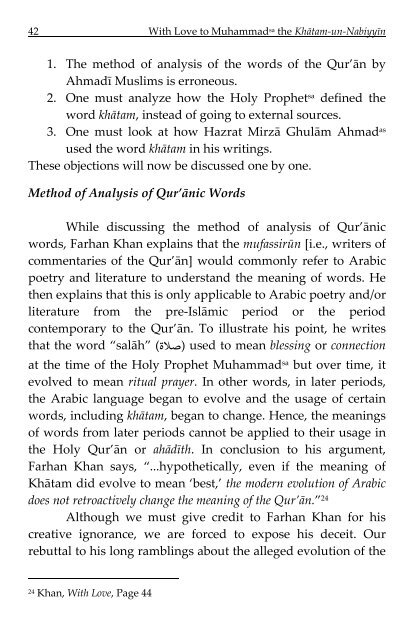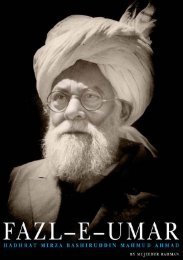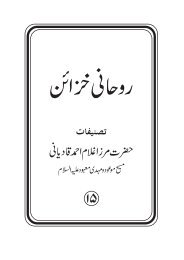- Page 1:
With Love to Muhammad sa the Khāta
- Page 5 and 6:
With Love to Muhammad sa the Khāta
- Page 8:
وَ قُلْ جَآءَ
- Page 11 and 12:
Hadīth Number 5 - Al-‘Āqib: Aft
- Page 14: Acknowledgements We would like to e
- Page 17 and 18: ذ ع غ ق ء dh, pronounced like
- Page 19 and 20: comprehensive response to the alleg
- Page 21 and 22: ّ ّ َ َ last 14 centuries - tha
- Page 24 and 25: بمaااللهaارحنaارحم
- Page 26 and 27: Introduction 3 ‘Īsā bin Mariam
- Page 28: Introduction 5 Many non-Ahmadī Mus
- Page 31 and 32: ِ ِ ُ ِ ُ ُ 8 With Love to Mu
- Page 33 and 34: 10 With Love to Muhammad sa the Kh
- Page 35 and 36: 12 With Love to Muhammad sa the Kh
- Page 39 and 40: jì assuaged. ] ÷ n»Ãôø Ü»
- Page 41 and 42: 18 With Love to Muhammad sa the Kh
- Page 43 and 44: ْ َ َ ُ ُ ِ ُ 20 With Love t
- Page 45 and 46: 22 With Love to Muhammad sa the Kh
- Page 47 and 48: 24 With Love to Muhammad sa the Kh
- Page 49 and 50: 26 With Love to Muhammad sa the Kh
- Page 51 and 52: 28 With Love to Muhammad sa the Kh
- Page 53 and 54: َ ُ 30 With Love to Muhammad sa t
- Page 55 and 56: 32 With Love to Muhammad sa the Kh
- Page 57 and 58: 34 With Love to Muhammad sa the Kh
- Page 59 and 60: 36 With Love to Muhammad sa the Kh
- Page 61 and 62: 38 With Love to Muhammad sa the Kh
- Page 63: 40 With Love to Muhammad sa the Kh
- Page 67 and 68: ُ َ ُّ ّ ً َ َّ ْ َ 44 W
- Page 69 and 70: 46 With Love to Muhammad sa the Kh
- Page 71 and 72: َ َ َ 48 With Love to Muhammad s
- Page 73 and 74: 50 With Love to Muhammad sa the Kh
- Page 75 and 76: 52 With Love to Muhammad sa the Kh
- Page 77 and 78: ٰ 54 With Love to Muhammad sa the
- Page 80 and 81: ۙ Last Law-bearing Prophet sa Misr
- Page 82 and 83: ؕ ؕ Last Law-bearing Prophet sa 5
- Page 84 and 85: Last Law-bearing Prophet sa 61 When
- Page 86 and 87: Last Law-bearing Prophet sa 63 It m
- Page 88 and 89: Last Law-bearing Prophet sa 65 accu
- Page 90 and 91: Last Law-bearing Prophet sa 67 disc
- Page 92 and 93: Last Law‐bearing Prophet sa 69 be
- Page 94 and 95: Last Law-bearing Prophet sa 71 Chri
- Page 96 and 97: Last Law-bearing Prophet sa 73 As f
- Page 98 and 99: Last Law-bearing Prophet sa 75 upon
- Page 100 and 101: Last Law-bearing Prophet sa 77 to d
- Page 102 and 103: Last Law-bearing Prophet sa 79 When
- Page 104 and 105: ٰ َ ّ ْ ّ َ Last Law-bearing
- Page 106 and 107: Last Law-bearing Prophet sa 83 For
- Page 108 and 109: ۚ Last Law-bearing Prophet sa 85 t
- Page 110 and 111: Last Law-bearing Prophet sa 87 Was
- Page 112 and 113: Last Law-bearing Prophet sa 89 the
- Page 114 and 115:
Statements of Prophet Muhammad sa I
- Page 116 and 117:
Statements of Prophet Muhammad sa 9
- Page 118 and 119:
Statements of Prophet Muhammad sa 9
- Page 120 and 121:
Statements of Prophet Muhammad sa 9
- Page 122 and 123:
Statements of Prophet Muhammad sa 9
- Page 124 and 125:
Statements of Prophet Muhammad sa 1
- Page 126 and 127:
ٰ ٰ ٰ Statements of Prophet Muha
- Page 128 and 129:
Statements of Prophet Muhammad sa 1
- Page 130 and 131:
Statements of Prophet Muhammad sa 1
- Page 132 and 133:
Statements of Prophet Muhammad sa 1
- Page 134 and 135:
ٰ Hadīth of Hazrat ‘Alī ra and
- Page 136 and 137:
Hadīth of Hazrat ‘Alī ra and L
- Page 138 and 139:
Hadīth of Hazrat ‘Alī ra and L
- Page 140:
Hadīth of Hazrat ‘Alī ra and L
- Page 143 and 144:
َ ْ ّ ِ ّ ّ َ ّٰ َّ َّ
- Page 145 and 146:
122 With Love to Muhammad sa the Kh
- Page 147 and 148:
124 With Love to Muhammad sa the Kh
- Page 149 and 150:
126 With Love to Muhammad sa the Kh
- Page 151 and 152:
128 With Love to Muhammad sa the Kh
- Page 153 and 154:
َّ ُ َ َ 130 With Love to Muha
- Page 155 and 156:
َ 132 With Love to Muhammad sa the
- Page 157 and 158:
َ ْ ُّ ّ َ 134 With Love to M
- Page 160 and 161:
“I am the Last Brick and I am the
- Page 162 and 163:
ّ َ َ “I am the Last Brick and
- Page 164 and 165:
“I am the Last Brick and I am the
- Page 166 and 167:
“I am the Last Brick and I am the
- Page 168 and 169:
“I am the Last Brick and I am the
- Page 170 and 171:
“I am the Last Brick and I am the
- Page 172 and 173:
ِ ِ ِ ِ “I am the
- Page 174 and 175:
“I am the Last Brick and I am the
- Page 176 and 177:
“I am the Last Brick and I am the
- Page 178 and 179:
Statements of Hazrat Muhyud-dīn Ib
- Page 180 and 181:
ٍ Statements of Hazrat Muhy-ud-dī
- Page 182 and 183:
Statements of Hazrat Muhy-ud-dīn I
- Page 184 and 185:
Statements of Hazrat Muhy-ud-dīn I
- Page 186 and 187:
Statements of Hazrat Muhy-ud-dīn I
- Page 188 and 189:
Statements of Hazrat Muhy-ud-dīn I
- Page 190 and 191:
Statements of Hazrat Muhy-ud-dīn I
- Page 192 and 193:
ُّ Statements of Hazrat Muhy-ud-d
- Page 194 and 195:
Statements of Hazrat Muhy-ud-dīn I
- Page 196 and 197:
Statements of Hazrat Muhy-ud-dīn I
- Page 198 and 199:
Statements of Hazrat Muhy-ud-dīn I
- Page 200 and 201:
Statements of Hazrat Muhy-ud-dīn I
- Page 202 and 203:
Statements of Hazrat Muhy-ud-dīn I
- Page 204:
Statements of Hazrat Muhy-ud-dīn I
- Page 207 and 208:
184 With Love to Muhammad sa the Kh
- Page 209 and 210:
186 With Love to Muhammad sa the Kh
- Page 211 and 212:
188 With Love to Muhammad sa the Kh
- Page 213 and 214:
ؕ 190 With Love to Muhammad sa the
- Page 215 and 216:
192 With Love to Muhammad sa the Kh
- Page 217 and 218:
194 With Love to Muhammad sa the Kh
- Page 219 and 220:
196 With Love to Muhammad sa the Kh
- Page 221 and 222:
198 With Love to Muhammad sa the Kh
- Page 223 and 224:
َّ ُ ّ َ 200 With Love to Muha
- Page 225 and 226:
202 With Love to Muhammad sa the Kh
- Page 227 and 228:
204 With Love to Muhammad sa the Kh
- Page 229:
206 With Love to Muhammad sa the Kh
- Page 235 and 236:
212 With Love to Muhammad sa the Kh
- Page 237:
214 With Love to Muhammad sa the Kh
- Page 246:
Opinion of the Sahāba ra , Ā’im
- Page 252 and 253:
Opinion of the Sahāba ra , Ā’im
- Page 256 and 257:
Opinion of the Sahāba ra , Ā’im
- Page 258 and 259:
Opinion of the Sahāba ra , Ā’im
- Page 260 and 261:
Opinion of the Sahāba ra , Ā’im
- Page 262:
Opinion of the Sahāba ra , Ā’im
- Page 265 and 266:
242 With Love to Muhammad sa the Kh
- Page 267 and 268:
244 With Love to Muhammad sa the Kh
- Page 269 and 270:
246 With Love to Muhammad sa the Kh
- Page 271 and 272:
248 With Love to Muhammad sa the Kh
- Page 273 and 274:
250 With Love to Muhammad sa the Kh
- Page 275 and 276:
252 With Love to Muhammad sa the Kh
- Page 277 and 278:
254 With Love to Muhammad sa the Kh
- Page 279 and 280:
256 With Love to Muhammad sa the Kh
- Page 281 and 282:
258 With Love to Muhammad sa the Kh
- Page 283 and 284:
ؕ ّ 260 With Love to Muhammad sa
- Page 285 and 286:
262 With Love to Muhammad sa the Kh
- Page 287 and 288:
264 With Love to Muhammad sa the Kh
- Page 289 and 290:
َّ ؕ 266 With Love to Muhammad s
- Page 291 and 292:
ؕ 268 With Love to Muhammad sa the
- Page 293 and 294:
270 With Love to Muhammad sa the Kh
- Page 295 and 296:
272 With Love to Muhammad sa the Kh
- Page 297 and 298:
ؕ 274 With Love to Muhammad sa the
- Page 299 and 300:
276 With Love to Muhammad sa the Kh
- Page 301 and 302:
278 With Love to Muhammad sa the Kh
- Page 304 and 305:
َّ ُّ ْ َ َ َ َ ِ َ ْ
- Page 306 and 307:
Continuation of Prophethood accordi
- Page 308 and 309:
Continuation of Prophethood accordi
- Page 310 and 311:
Continuation of Prophethood accordi
- Page 312 and 313:
َ َّ َ َّ ِ َ َ َ ُ ُّ
- Page 314 and 315:
َ َ ُ Continuation of Prophethoo
- Page 316 and 317:
Continuation of Prophethood accordi
- Page 318 and 319:
Continuation of Prophethood accordi
- Page 320 and 321:
Continuation of Prophethood accordi
- Page 322 and 323:
Continuation of Prophethood accordi
- Page 324 and 325:
Continuation of Prophethood accordi
- Page 326 and 327:
Continuation of Prophethood accordi
- Page 328 and 329:
ٰ ٰ Continuation of Prophethood a
- Page 330 and 331:
َ َ ْ ْ َّ َّ َ ْ َّ Co
- Page 332 and 333:
ُّ Closing Comments Hazrat Mirzā
- Page 334 and 335:
Closing Comments 311 to Ahmadiyyat
- Page 336:
Closing Comments 313 We also pray t
- Page 339 and 340:
316 With Love to Muhammad sa the Kh
- Page 341 and 342:
318 With Love to Muhammad sa the Kh
- Page 343 and 344:
320 With Love to Muhammad sa the Kh
- Page 345 and 346:
322 With Love to Muhammad sa the Kh
- Page 347 and 348:
324 With Love to Muhammad sa the Kh
- Page 349 and 350:
326 With Love to Muhammad sa the Kh
- Page 351 and 352:
328 With Love to Muhammad sa the Kh
- Page 353 and 354:
330 With Love to Muhammad sa the Kh
- Page 355 and 356:
332 With Love to Muhammad sa the Kh
- Page 357 and 358:
334 With Love to Muhammad sa the Kh
- Page 359 and 360:
336 With Love to Muhammad sa the Kh
- Page 361 and 362:
338 With Love to Muhammad sa the Kh
- Page 363 and 364:
340 With Love to Muhammad sa the Kh
- Page 365 and 366:
342 With Love to Muhammad sa the Kh
- Page 368 and 369:
Appendix II: The Future of Islām A
- Page 370 and 371:
Appendix II 347 Announced by: Mirz
- Page 372 and 373:
Appendix II 349 messengers shall al
- Page 374 and 375:
Appendix II 351 Who was it that fru
- Page 376 and 377:
Appendix II 353 old. So do not grie
- Page 378 and 379:
Appendix II 355 understand that the
- Page 380:
Appendix II 357 The verse, ‘I sha
- Page 383 and 384:
360 With Love to Muhammad sa the Kh
- Page 385 and 386:
362 With Love to Muhammad sa the Kh
- Page 387 and 388:
364 With Love to Muhammad sa the Kh
- Page 389 and 390:
366 With Love to Muhammad sa the Kh
- Page 401 and 402:
About the Authors Farhan Iqbal Imam




